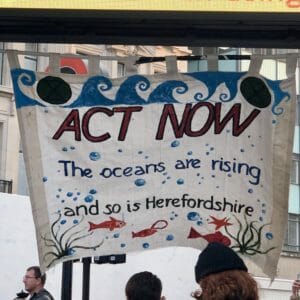Even though we are going though an extremely difficult and painful time right now with the COVID-19 virus on the loose, it does not mean we can put aside other critical issues such as climate change. Although due to the virus there are some positive environmental impacts like the canals of Venice clearing up and better air quality and blue skies in China, we are still facing incredible environmental impacts from ongoing pollution and unsustainable ways of living. As a safety precaution many climate strikes and environmental demonstrations have been cancelled and raising awareness on these issues has decreased. There is a way that everyone can contribute to activism from their home and be part of making a difference. Online activism requires no physical effort and if that has stopped you before, there are no excuses now. In this post I have gathered some tips and suggestions on how you can practise online activism from the comfort of your home.
Educate and research
I know it is so tempting to spend the whole day lying in bed binge watching Netflix series and we are all guilty of that which makes it completely normal. However, there are so many educational documentaries and series on environmental issues that provide a unique inside into what really is going on with our planet and by even watching one documentary a week you can make those braincells move and reprogram into a more sustainable and open-minded way of thinking. Some to consider watching are:
– Minimalism: A Documentary About the Important Things, the second most polluting industry after oil is fashion industry. Consumerism is such an easy trap to be tricked into and this documentary takes you back to a minimal mindset, making you realise the things that matter the most and that at the end of the day, happiness does not come from the amount of stuff you own.
–Broken, a series highlighting how money driven some companies are and how little they care about consumers. Have you ever considered what you support by buying from big companies that practise slavery and pollution, and that every action has a consequence?
If you are more of a bookworm like me, fear not, there are plenty of books to choose from! Here are just a couple I would recommend to start with:
–Doughnut Economics by Oxford academic Kate Raworth, a book recommended to me by one of my university professors. This book gives you a basic introduction into circular economy and bringing the study of economics into the 21st century making you say “Why haven’t I known this before” out loud every other page if not every.
–Let My People Go Surfing, a business memoir by Patagonia founder and owner Yvon Chouinard. A truly inspiring piece of work on how to create a business with the right values while taking care of the impacts created by the company and caring not only for the environment but also the people.
Organisations and companies
As a consumer you have a certain responsibility when it comes to the products you buy but more importantly, who you buy from. Have you researched your favourite brand lately? Do you know where your favourite pair of shoes came from? Not to scary you but there is a lot that companies try to keep hidden from you with numerous marketing tricks and greenwashing. Think of your values and compare those to the ones the brands you buy have. Do they match and are you willing to carry the responsibility of supporting those brands?
There are some companies that have made transparency one of their top values by promoting not only the ups but also the downs on their journey to sustainability. You may know of the work Patagonia does, or what Stella McCartney did with Adidas, but what about others? Now is a good opportunity to get to know what values and companies you support and some apps to help you do that are:
–Good On You, “We have so much power to change the world by just being careful in what we buy”, a quote by Emma Watson, an activist and supporter of Good On You. This website/app has made your job a bit easier by gathering ethical brands in one place and by rating your already existing ones for you. Go have a look and take responsibility!
–Think Dirty – Shop Clean, this app helps you recognise potential toxins in your everyday household, skincare and beauty products while educating you on what you not only put on your skin but also what you wash down the drain, a big responsibility of an everyday consumer.
Social Media
Making a difference starts from an individual level, once your beliefs and values are where you want them to be, share and promote them to others! Using social media to share your values is great and super easy too! If you read an article on sustainability or saw a video on pollution that you found interesting, share it on your Instagram, Facebook or whatever platform you prefer and bring it to the attention of those around you. Raising awareness on things that matter is such an important thing and one that can really influence change in consumerism habits and ways of living. Following organisations like Greenpeace, Extinction Rebellion and WWF will provide you with a lot of information on current issues and ways on how you can help through volunteering, sharing and donating. Some activists on social media include Jack Harries, a young film-maker and environmental activist who raises awareness through his film projects and by constantly sharing ideas, books and real life situations on environmental topics. Patagonia shares live screenings of environmental documentaries and talks with activist on their Instagram page, providing a great way to dive deep into these subjects.
As a small contribution to online activism, I am sharing my photos from a climate strike last April, organised by Extinction Rebellion in Oxford Circus, London.
I hope to have given you even a tiny spark of light and hope during this dark time through this post and urge you to take responsibility and action for a better future for us and the future generations to come.






